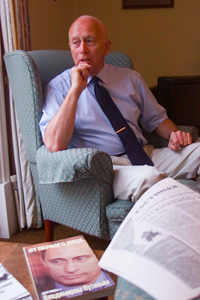
Professor Peter Frank
(picture courtesy of the Essex County Standard)
Peter, who died peacefully on Thursday 14 November, was a longstanding member of the Department of Government, having joined it to initiate the Soviet programmes in 1968.
With the Cold War in full swing, Russian studies was a progressive and very relevant subject to develop. Peter was their presiding spirit both in the University and in wider spheres. He was a strong believer in having personal and hands-on contact with the Soviet Union and followed on this by travelling there extensively, making many friends and contacts.
Essex became a leading British centre in the area - even pioneering quantitative studies of career patterns and elites at a time when reliable data and evidence was hard to come by.
Peter's expertise was nationally recognised when he became the Soviet specialist for Channel 4 News, and later a consultant to the John Smith Foundation on promoting political and social development in Eastern Europe during the 1990s.
He was however also a man of wide cultural interest extending beyond his academic speciality to quite surprising areas like his postcard collection. in retirement he researched the social history of his native Whitby, publishing some of the fruits in an authoritative book on fishing communities on the Yorkshire coast.
A fine traditional scholar Peter came to academia by a most unusual route - even more unusual for a provincial working class lad in the 1950s and 1960s.
Having worked as a bicycle mechanic after leaving school, he was conscripted into the Army at 18. On the basis of his O-levels he was offered a chance to study Russian and interpret radio communications. Failure would result in being sent to the Korean War or the emergency in Malaysia. Under this menacing inducement Peter managed to pass the course and was demobbed with a command of Russian.
With this and support from Mary (both moral and financial), he trained as a teacher and then went on to University, moving on from graduate work at Leeds to the position at Essex.
A Yorkshire patriot, Peter yearned to return there after his move away. With children growing up in Colchester and Mary's burgeoning political career he gradually contented himself with a second home in the Dales and frequent return visits.
He was a popular and genial consort to Mary during her term as Mayor of Colchester in 1992-93, and kept up his connections with the University even as Area Studies became absorbed into the wider study of Comparative Politics with the collapse of the old Soviet Union and increasing globalisation across all the areas.
Peter suffered increasingly poor health over the last five years but bore it all with fortitude and dignity, finding solace in his close family ties which now included many grandchildren.
One of my vivid memories is of our last walk together with a Departmental group in the North Downs - where after traversing some secluded valleys we stumbled, quite by chance, on the pub next the camp where he had studied Russian fifty years before. In a way that brought things together - North and South, past and present, Russia and Whitby.
We were all glad to share the recollection with him as we had shared the experience of building up the Department in the 1970s and '80s. We shall sorely miss Peter as a good friend, colleague and neighbour, always willing to go to the remotest places and smallest groups to share his knowledge and experience with them. We have all benefited from knowing him.
Emeritus Professor Ian Budge, Department of Government
Professor Frank’s funeral takes place on Monday 2 December at 2.45pm at Colchester Crematorium. The family have asked that there should be family flowers only but donations may be made to British Lung Foundation for research into pulmonary fibrosis, c/o Hunnaball of Colchester, York House, 41 Mersea Road, Colchester CO2 7QT.